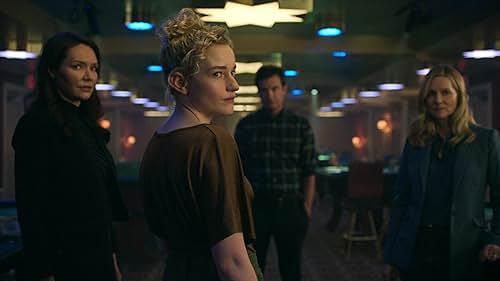In the saturated landscape of crime dramas, where narratives often orbit around the familiar themes of moral ambiguity and lawlessness, “Ozark” emerges as a distinct yet underappreciated gem. Despite its critical acclaim and a loyal fanbase, this Netflix series remains overshadowed by its more mainstream counterparts like “Breaking Bad” and “Narcos.” Yet, a closer examination reveals that “Ozark” offers a unique blend of intricate storytelling, complex character development, and a meticulously crafted atmosphere that sets it apart from its peers. This article delves into the nuanced elements that make ”Ozark” not only a compelling watch but arguably the most underrated crime drama of its time, deserving of wider recognition and appreciation. Through an analytical lens, we will explore how its thematic depth, narrative innovation, and cinematic execution contribute to its understated brilliance, inviting viewers to reconsider its place in the pantheon of crime television.
Character Complexity and Development
One of the key elements that sets Ozark apart from other crime dramas is its intricate portrayal of . The show delves deeply into the psyche of its characters, unraveling layers that reveal motivations, fears, and moral ambiguities. Marty Byrde, the protagonist, is not a typical anti-hero; he is a financial planner turned money launderer whose choices are driven by a desperate need to protect his family. This multifaceted nature makes him both relatable and unpredictable, keeping the audience constantly engaged.
- Wendy Byrde transforms from a supportive spouse into a powerful, assertive player in the criminal world, showcasing a dynamic evolution that challenges traditional gender roles.
- Ruth Langmore, initially portrayed as a hardened criminal, reveals a vulnerability and intelligence that defy her circumstances, making her one of the most compelling characters on the show.
- Agent Roy Petty and other supporting characters are crafted with equal care, each bringing their own complex moral dilemmas and personal struggles to the storyline.
Such intricate character development not only enriches the narrative but also offers viewers a profound exploration of human nature, making Ozark a standout in the crime drama genre.

Intricate Plot Weaving and Storytelling
The brilliance of Ozark lies in its ability to craft a narrative that intricately weaves multiple storylines while maintaining a cohesive and compelling plot. This series excels in balancing the delicate act of intertwining the Byrde family’s personal struggles with the overarching criminal enterprises they become embroiled in. Each episode skillfully unravels layers of deception, loyalty, and moral ambiguity, keeping the audience constantly guessing. The show does not rely on mere shock value but rather builds tension through a series of well-crafted events that escalate organically.
What sets Ozark apart from other crime dramas is its dedication to character development and narrative depth. The writers deftly utilize the following elements to enhance the storytelling experience:
- Complex Characters: Each character is multi-dimensional, with motivations that evolve throughout the series.
- Realistic Dialogue: Conversations are authentic and serve to advance the plot and reveal character intentions.
- Layered Conflicts: The show explores both internal and external conflicts, providing a rich tapestry of tension.
These elements contribute to a gripping narrative that is as unpredictable as it is engaging, solidifying Ozark‘s place as a standout in the crime drama genre.
Atmospheric Setting and Cinematic Style
The atmospheric tension in “Ozark” is meticulously crafted through its visual and auditory elements, creating a sense of foreboding that permeates every scene. The show employs a muted color palette of blues and grays, which not only mirrors the somber themes of moral ambiguity and desperation but also enhances the show’s brooding tone. The use of natural lighting further contributes to the raw and gritty realism, making the viewer feel as though they are peering into the dark corners of the criminal underworld. The cinematography often utilizes wide shots to capture the expansive yet isolating landscapes of the Ozarks, emphasizing the characters’ entrapment within their own choices.
- Symbolic Imagery: Recurring motifs such as water and the wilderness reflect the constant flow of danger and the untamed nature of crime.
- Sound Design: A haunting score combined with strategic silences heightens the suspense and amplifies emotional impact.
- Editing Style: Quick cuts and cross-cutting techniques maintain a brisk pace, mirroring the urgency and unpredictability of the plot.
These stylistic choices collectively forge a unique cinematic experience that distinguishes “Ozark” from its peers, making it an unmissable gem in the crime drama genre.

Critical Acclaim and Viewer Reception
While “Ozark” may not have garnered the mainstream buzz of some of its contemporaries, it has consistently earned high praise from critics and audiences alike. Many reviewers have lauded the show for its intricate storytelling and intense character development. The series has been particularly noted for its ability to maintain suspense and deliver unexpected plot twists, often compared to some of the most revered crime dramas in television history. Jason Bateman and Laura Linney have been singled out for their exceptional performances, portraying complex characters that resonate deeply with viewers.
- Complex Characters: The depth of character arcs and the moral ambiguities faced by the Byrde family set the show apart.
- Cinematic Quality: The show’s visual style and direction have been described as cinematic, enhancing the storytelling experience.
- Cultural Impact: Despite its understated presence in pop culture, “Ozark” has sparked discussions on crime and morality, drawing in a dedicated fanbase.
Viewer reception has been equally positive, with many fans expressing admiration for the show’s ability to keep them on the edge of their seats. The slow-burn narrative structure, combined with meticulously crafted tension, has created a loyal following that passionately defends its underrated status. As audiences delve deeper into the world of the Ozarks, the show continues to captivate with its gritty realism and relentless pace.
Closing Remarks
while “Ozark” may not have initially garnered the widespread acclaim of other crime dramas, its intricate storytelling, complex characters, and exploration of moral ambiguity have earned it a distinct place within the genre. By delving into the human psyche and the consequences of desperate choices, the series offers a compelling narrative that challenges viewers to reflect on the nature of crime and redemption. Its subtle yet powerful commentary on societal issues further enriches its narrative depth, making “Ozark” a formidable contender in the realm of crime dramas. As audiences continue to discover its layered storytelling and exceptional performances, “Ozark” stands poised to receive the recognition it rightfully deserves.
